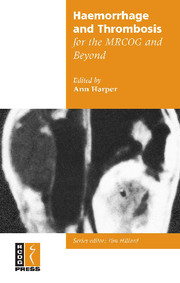Book contents
- Frontmatter
- Contents
- About the authors
- Abbreviations
- Preface
- 1 The coagulation system in pregnancy
- 2 Pregnancy in women with inherited bleeding disorders
- 3 Maternal and fetal thrombocytopenia
- 4 Massive obstetric haemorrhage
- 5 Disseminated intravascular coagulation
- 6 Gynaecological problems in women with bleeding disorders
- 7 Venous thromboembolism in obstetrics and gynaecology
- 8 Genetic thrombophilias and antiphospholipid antibodies
- Index
Preface
Published online by Cambridge University Press: 05 October 2014
- Frontmatter
- Contents
- About the authors
- Abbreviations
- Preface
- 1 The coagulation system in pregnancy
- 2 Pregnancy in women with inherited bleeding disorders
- 3 Maternal and fetal thrombocytopenia
- 4 Massive obstetric haemorrhage
- 5 Disseminated intravascular coagulation
- 6 Gynaecological problems in women with bleeding disorders
- 7 Venous thromboembolism in obstetrics and gynaecology
- 8 Genetic thrombophilias and antiphospholipid antibodies
- Index
Summary
Although disorders of the coagulation system are uncommon in pregnancy, the two main hazards, haemorrhage and thromboembolism, are leading causes of direct maternal death in the UK and worldwide. The fetus may be seriously affected by some bleeding disorders and by the consequences of major maternal haemorrhage or thromboembolism. Gynaecologists may encounter abnormal haemostasis as a cause of intractable menorrhagia or perioperative haemorrhage, and thromboembolism is a significant risk for women undergoing major gynaecological surgery. As more is discovered about the coagulation system, it is becoming apparent that some women are at increased risk of haemorrhage or thrombosis. This book, which brings together various aspects of haemostasis in relation to obstetrics and gynaecology, will be useful to candidates preparing for the MRCOG examination and may provide some practical guidance for doctors who only occasionally encounter these conditions. Good working relationships and close liaison between obstetricians and gynaecologists, anaesthetists, haematologists, and the blood transfusion service are essential to ensure the best outcome for women with disturbances of haemostasis or thrombosis. My appreciation and thanks to all the contributors.
- Type
- Chapter
- Information
- Haemorrhage and Thrombosis for the MRCOG and Beyond , pp. xi - xiiPublisher: Cambridge University PressPrint publication year: 2005

